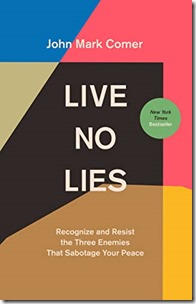That’s not a phrase we hear quite as frequently these days, but the concept is still there. It’s incredibly interesting that we even acknowledge that there is such a thing as a lie. in a postmodern society where we have unquestioning mantras like “just live your own truth” somehow we still carry about this notion of untruth.
Into this context, John Mark Comer has written Live No Lies. As a modern and civilized society we believe we’ve moved on from such dated concepts like demons and devils and personal sin and guilt. Yet, what if they’re real? What if they’re real and harming us.
Comer argues that “the world, the flesh, and the devil are alive and well; and aided by our skepticism, they are wreaking havoc in our souls and society.” (xxii) The idea of being at war with the world, the flesh, and the devil is not new to Comer. This is an age old argument. What is unique is how Comer ties them together.
His theory is that the strategy of the enemy is to use deceptive ideas (devil), which plays to our disordered desires (flesh), that are normalized in sinful society (the world). (xxiii)
Summary
The book itself is divided into these three categories. In the first four chapters the author gets at the heart of lies. He talks about the importance of ideas and shows how they have great power when we believe them. He peels the curtain back on some of the deceptive things we believe in our own culture.
We live in a world of half-truths, and Christians are just as prone to believing them. So Comer calls us to live in the whole truth—employing a few time-tested strategies to assist us.
In the next four chapters Comer gets to the heart of desire and shows how unabated our fallen desires will push us towards bondage and not freedom. One of the lies we believe is that living to our hearts desire will give us the freedom which we long for. He helps us redefine freedom with the biblical authors:
Freedom not just to choose but to choose the good. For them, freedom isn’t about autonomy but about liberating loving relationships from sin. And positive freedom means we need a kind of power from outside ourselves to overcome our (strong) desires for self-gratification and fulfill our (deep) desires for self-giving love. (137)
The Law of Returns is one of the strongest chapters in this work. He shows how choices leads to either freedom or slavery, noting that, “our freedom expands or shrinks with each decision we make”. (159) We reap what we sow and each moment we are establishing and building into our character. And as Comer says, “Character is our destiny.” (166)
As with the other sections, Comer gives a strategy to help us battle. Here the strategy is to live by the Spirit. Again, he pushes us towards ancient practices like fasting and confession. The devil will use our disordered desires to feed us lies, but when we practice fasting and confession we are better equipped to battle.
The final section, the world, is only two chapters. Here he attempts to expand our horizons into thinking about what actually comprises “the world” in the Bible. He notes that there is a “jarring difference between Jesus and both the Left and the Right’s visions of human flourishing.” (213) He aptly shows how there are things opposed to the kingdom of Jesus within the vision of each of these world systems.
He concludes by encouraging believers to gather with their local church. Living amongst other people will sharpen and shape us. The summary of this section serves as an apt summary of the entire book:
The devil’s deceptive ideas get as far as they do because they appeal to our flesh’s animal cravings. But these in turn find a home in our bodies through the echo chamber of the world, which allows us to assuage any guilt or shame and live as we please. As a result, evil is often labeled good, and good, evil; and the soul and society devolve into a reign of anarchy via the loss ofa moral and spiritual true north. In such an exilic moment, the church as a counter-culture has the potential to not only survive but also flourish as a creative minority, loving the host culture from the margins. (243)
Conclusion
Comer’s thesis—and the execution of that thesis—is thought-provoking. I appreciate his solutions being time-honored traditions and spiritual disciplines. One can see that the enemy is using our disordered desires and the world system to continue feeding us lies and ultimately destroy us. But this isn’t a new strategy, it just looks new with each age. The tools used to battled the enemy throughout the centuries are still valid for today.
I would highly encourage reading this book. It’s both engaging and convicting. It helps me to think through lies which I might be believing, ways in which I’ve perhaps made friends with the world, and encourages me into simple disciplines. Now, it’s just a matter of rightly applying them and living them out.
Purchase it here.
